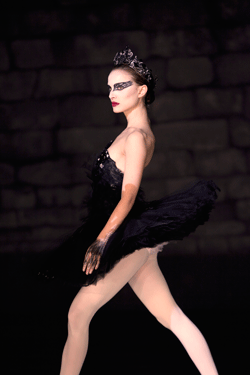Is “Black Swan” a ballet film? Though dancers occupy almost every frame of the movie, the description seems inappropriate. Ballet summons images of ineffable grace—the straight line of a leg, a seamless pirouette—yet “Black Swan” is devoid of that sublime spirit. Instead we witness a very different kind of pursuit: the drive to perfection, and the demons that inevitably arise as a result.
And I do mean demons. Viewers looking to relive the pleasures of “La Danse,” Frederick Wiseman’s 2009 study of the Paris Opera Ballet, are advised to look elsewhere. Directed by Darren Aronofsky, “Black Swan” is essentially a horror movie, though admittedly one with an array of fine-looking monsters.
Case in point: our lead, Nina Sayers, played by the worrisomely lithe Natalie Portman. Nina is an ambitious member of an unnamed New York City ballet company. Ballet is her life and her mother’s too: when Nina isn’t rehearsing in the studio she is home with her mother (Barbara Hershey) rehashing the day’s successes and slights. A serious student of her art, Nina isolates herself from the other dancers, eschewing the gossip that brings them together. A rare opportunity presents itself when the company’s brash artistic director, Thomas Leroy (Vincent Cassell), decides to mount a new production of “Swan Lake.” The company’s reigning diva, Beth Macintyre (Winona Ryder), has grown too old for the part, so Leroy is in search of a new Swan Queen.
The part is as plum as they come, and the young dancers (literally) leap at the chance. The backstage backbiting that ensues is brutal: the denizens of HBO’s “Hard Knocks” have nothing on these ladies. When Nina ultimately wins the part, she is at once ebullient and shattered, unsure whether she can handle the high expectations, not to mention the innuendos being hurled at her from her fellow dancers.
Nina is a tender soul to begin with: she is clearly anorexic, a fact common enough in ballet that it merits only a few brief references. She also likes to cut herself and is haunted by a nefarious doppelgänger, which seems to be a hallucination. Nina has these demons mostly under control at the film’s start, but they are let loose again when she begins the intense rehearsal process. It doesn’t help that Leroy considers her too frigid to play the complex role of the Swan Queen and pushes her to shake her inhibitions.
Cassell is just one of the demons taunting Nina. Lily (Mila Kunis), her chief competition, tries to befriend Nina after joining the ballet company, but her motives are suspect. Macintyre, her legs mangled in a car accident shortly after her retirement, stands as a haunting reminder of the short life of a dancer. (Poor Winona Ryder: cast here as a wash-up and as Spock’s mother in “Star Trek.” She is only 39!) Finally, Erica Sayers, Nina’s mother, is the very definition of a stage mother, a former dancer who grows increasingly desperate as her daughter strays from her Upper West Side nest. Not since “Rosemary’s Baby” has a Manhattan apartment looked so menacing.
With “The Wrestler,” Aronofsky exhibited a keen eye for a good script, and he has picked another intriguing one here. “Swan Lake” is a clever way to explore Nina’s mental disorder, which seems to be a form of schizophrenia. As the Swan Queen, Nina is called on to play the roles of both the White Swan and the Black Swan. In the ballet, the White Swan’s lover is wooed by the Black Swan, prompting the White Swan to take her life. Nina is a natural as the White Swan, her precise mastery of movement evident to all. Yet she cannot quite master the looser, more volatile role of the Black Swan, at least not without descending deeper into psychosis.
The portrayal of Nina’s downward spiral is the film’s chief flaw. The line between reality and delusion grows increasingly blurred, which is no doubt true to the experience of schizophrenics, but too often the audience is left confused. Nina’s doppelgänger, for one, remains a cipher, showing up now and then, but not always for a compelling psychological reason.
Why is she haunting Nina, and why would Nina confuse her with Lily? The connections are tenuous and left to the viewer to decipher. At times, the symptoms of Nina’s disorder are unintentionally comic, as when her toes grow to ogre-like proportions. Camp is an essential element of some classic horror films, but it seems out of place here. The film’s Bernard Herrmann-esque score is a clear sign that Aronofsky is aiming for suspense, not satire.
Yet certain touches are spot-on. Nina’s obsession with cutting herself, for example, is a textbook manifestation of the impulse to control. In her no-holds-barred quest for perfection, Nina finds herself testing her limits of pain. Few movements are as unnatural as standing on one toe, yet Nina must perform the act over and over again. In her distorted state of mind, inflicting pain on herself is a discipline she must endure in order to refine her skills as a ballerina. Portman has received well-deserved praise for her physical commitment to her role. (She trained for six months prior to filming.) Yet she deserves equal credit for plumbing the depths of Nina’s fragile psyche.
Most of “Black Swan” takes place during periods of rehearsal, so it is exhilarating to see the production come together at the end. Considering the last actor Aronofsky filmed in tights was Mickey Rourke, his staging of the dance sequences is surprisingly effective. The final plot points, which I won’t divulge here, are less compelling and border on the implausible. The director deserves credit, however, for leaving the audience to ponder a crucial question: is perfection attainable?
Nina seems to think so. On the stage, at least, she can keep her demons at bay and achieve a state of near bliss. Yet this is her tragic mistake. In pursuing perfection, Nina has all but shut herself off from the workings of grace—the only truly effective salve for a wounded soul. Grace, after all, cannot be achieved, though it is freely given. Sadly, Nina never makes that leap.
Corps de Ballet: 'Black Swan' chronicles a dancer's quest for perfection
The latest from america
Pope Francis taught the church that the magisterium finds its clarity not merely in propositions but in acts of mercy.
Listen to the first episode of a new daily podcast series by America magazine’s editors on the ground in Rome covering the conclave to elect the new pope.
The conclave to elect the next pope will open on May 7, Vatican officials announced today. The cardinals meeting in plenary assembly (called general congregations) in the Vatican decided the date this morning, April 28.
The attention of the church now turns decisively to the question of Francis’ successor and the preparations for the conclave that will elect him.









An excellent review.
I saw The Black Swan last night and was deeply moved by the dance and the performance. I appreciate the insights offered here.
All of the actors were excellent. I agree the plot was somewhat implausible. And I think the sex scenes, as is common today, were too graphic. In this sort of movie, more old fashioned hinting would have also worked better artistically. Overall, the movie is a downer. Good acting to be appreciated, but that is all.